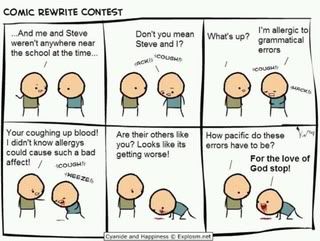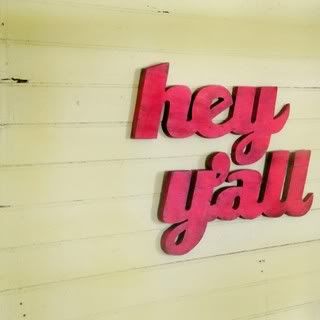
comic from this dumb tumblr
And I generally give a kind little laugh, because I understand why they'd think I'd like it, but here's what I'm thinking: This is dumb.
When it comes to language, you're either a linguistic descriptivist or a linguistic prescriptivist. Lots of people have described this distinction better than I'm about to (such as this brief and brilliant manifesto from the Linguistic Society of America), but basically, Descriptivists seek to describe how a given language is. Prescriptivists seek to describe how a given language should be. If you're a self-described "grammar nazi" (and by the way, ew at that name too), then you're a prescriptivist.
I'm not a linguist. But I have studied a lot of languages, mostly ancient ones, so I do know this much. They say you can't step in the same river twice. Language is the same way. It is a breathing, evolving, crazy thing that is created by the people who use it. What's unthinkable today is standard tomorrow. Did you really ever think we'd start saying 'blog, short for WEBLOG?? I, for one, did not.
Linguistic prescriptivism is like trying to catch a falling star. It's futile.
But more than that, it has some pretty classist and even racist implications.
To say that some language is right and some is wrong is to make a value judgement. Many people who use "nonstandard" language were brought up speaking dialects. Some language features are divided along regional lines. But some are divided along class and cultural lines. These dialects and language features are often derided as having "no grammar" or "bad grammar," when in fact they have distinct, legitimate, and well-documented grammars all their own. They're just different than what is considered to be standard.
In some cases, they even address gaps in the "standard" language. Consider Southern American y'all, and yous, which is heard among working-class northeastern Americans. They created a second-person plural where standard English lacks a distinction between the singular and plural.
Growing up in Tennessee, I grew up immersed in Southern American English, which I heard to a greater or lesser extent from most of the people in my life (with the notable exception of my Midwestern father). There is no greater punching bag among American dialects than my native one. Writers love to give a stupid character a deep drawl. Laughs at the overdone accents of Cletus the Slack-Jawed Yokel and Kenneth Parcell are, in some ways, at our expense.

buy this amazing wall decor on Etsy if you're so inclined
Finally, I beg the "grammar nazis" around me to consider how they came to know the difference between who and whom. They were fortunate to be educated in those differences. Not everyone has had the same opportunities. And if anyone would care to retort that these skills are taught in elementary school, which is compulsory in the US, I would invite those people to spend a morning in, say, an underprivileged New Orleans public school 3rd grade grammar class on an empty stomach. Just the fact that most people attend elementary school in the US does not mean that we are all afforded the same opportunities.
But...I'm an editor. How do I reconcile my heartfelt feelings about language prescriptivism vs. language descriptivism with my profession? Why on Earth would a person with such touchy-feely ideas about language ever ever ever want to wield a red pen and a Chicago Manual of Style for a living?
I love language. I'm a perfectionist. And my whole life, I have really excelled at making text conform to a given style. Linguistic descriptivists generally agree that there is a value to a measure of standardization to mass communications. Keeping mass-consumed informational texts fairly standardized allows us precision of language where it is needed. So I run a tight ship when it comes to grammar, syntax, spelling, and style in my books. But I do so with the full acknowledgement that my way is not the only way.
And that's why I think groups like this are unimpressive and silly.
So go forth and write however y'all damn well please.
Oh, and if you're interested in hearing what someone much more intelligent and interesting than me has to say about this issue, read David Foster Wallace's amazing article "Tense Present: Democracy, English, and the Wars over Usage." (High five pal Julia for that totally apt link.)
Discussion question:
What is your favorite non-standard English word or expression?
















